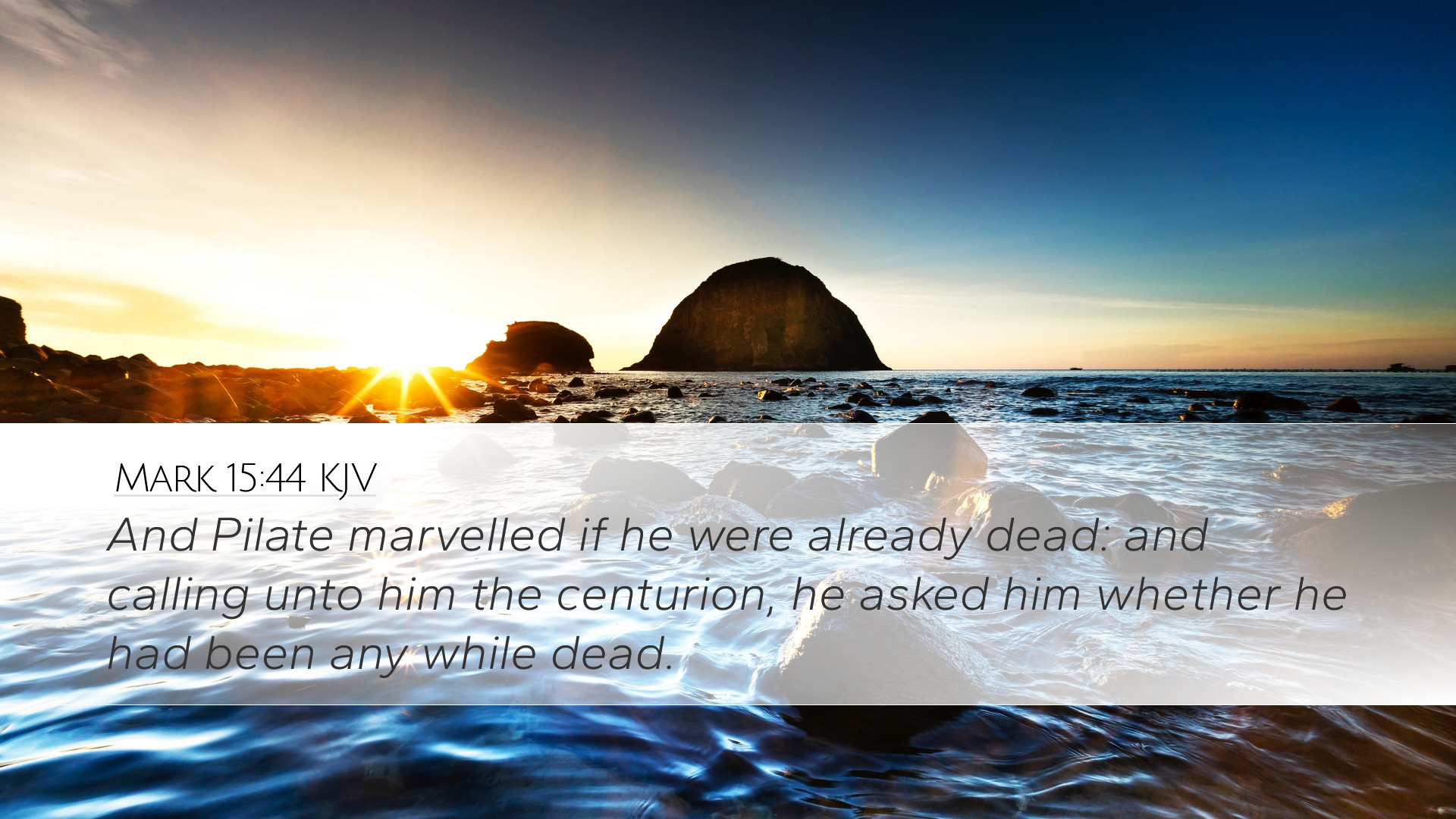Commentary on Mark 15:44
Mark 15:44 states: “And Pilate marveled if he were already dead: and calling unto him the centurion, he asked him whether he had been any while dead.” This verse occurs in the context of Jesus' crucifixion and subsequent death, revealing significant insights about the nature of His death, the role of Roman authority, and the fulfillment of prophecy.
Contextual Overview
The crucifixion of Jesus, a pivotal event in the New Testament, involved multiple players, including Roman officials, soldiers, and the religious authorities of the time. Pilate's amazement at Jesus' death points to a key element in the understanding of His crucifixion and the implications it bears for redemption.
Pilate’s Role and Authority
Matthew Henry, in his commentary, emphasizes Pilate's role as a representative of Roman authority. Pilate was surprised that Jesus was already dead because a crucifixion often lasted several hours or even days. From this, we can draw insights about the power dynamics at play. Pilate's inquiry into the centurion's report reflects both the responsibility of a governor and the astonishment at the rapidity of Christ's death.
The Nature of Christ's Death
Albert Barnes notes the significance of Jesus' death not merely as an event but as the fulfillment of God's plan for salvation. Jesus' death confirms His identity as the sacrificial Lamb, whose death was prophesied in Jewish tradition. The quick death of Jesus serves to show that He willingly laid down His life, thus affirming His complete control over the situation, even in death.
Centurion’s Testimony
Adam Clarke elaborates on the importance of the centurion's involvement in this scene. The centurion’s role points to the recognition of Jesus’ divine nature, as expressed in Matthew 27:54, where the centurion declares, “Truly this was the Son of God.” This reflects the impact of Jesus’ death on those who witnessed it and signifies a turning point in understanding Jesus’ true identity.
Spiritual Implications
This verse invites deeper reflection on several spiritual implications:
- The Nature of Suffering: Both Henry and Barnes convey that Christ's suffering was unique and essential to His role as Savior. His quick death highlights the agony He endured for humanity's sake.
- The Fulfillment of Prophecy: Jesus' death aligns with Old Testament prophecies, fulfilling God's redemptive plan. The awareness of prophetic fulfillment underscores the divine orchestration of events surrounding the crucifixion.
- The Authority of Christ: The astonishment of a Roman governor signifies that Jesus’ authority transcends earthly power. Even in death, Jesus remains sovereign, emphasizing His divine identity.
Theological Themes
Pastors and theologians might find the following theological themes particularly significant:
- Redemption and Sacrifice: The quick death references the effective sacrifice made by Christ. It sets the stage for understanding the doctrine of atonement.
- Humanity’s Response: Pilate's marvel points to a common human reaction to the divine. The centurion’s amazement leads to ultimate recognition, urging believers to reflect on their response to Christ.
- Intervention of Grace: The scene hints at the divine grace that offered Jesus as the ultimate sacrifice and extends to all who would believe.
Concluding Reflections
Mark 15:44 serves as a moment of profound significance within the crucifixion narrative. The simplicity of the text unveils deep theological truths about Jesus’ identity, the nature of His sacrificial death, and the authority of God’s sovereign plan. As we reflect on this passage, we are reminded of the foundational truths of the Christian faith regarding Christ's atonement and the implications for our faith and practice.
In summary, the commentary from notable public domain theologians provides a multi-faceted understanding of Mark 15:44. By examining the context, the characters involved, and the broader theological implications, we are encouraged to delve deeper into the sacred narrative and its relevance for our lives today.


